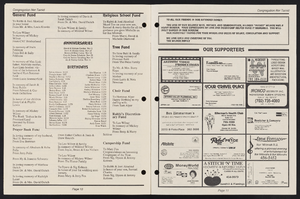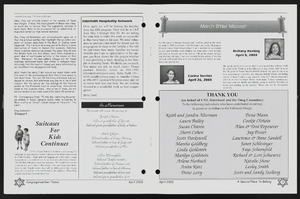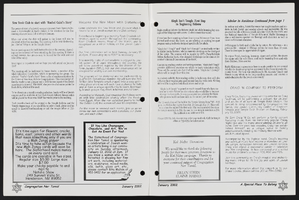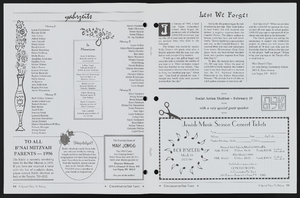Search the Special Collections and Archives Portal
Search Results
Maude Frazier Professional Papers
Identifier
Abstract
The Maude Frazier Professional Papers (1955-1962) contain programs honoring Frazier, a University of Nevada, Reno commencement program, and a groundbreaking ceremony for the Nevada Southern Second Building. Also included are awards of appreciation and certificates for her dedicated service to the Las Vegas, Nevada community. The materials focus on her later career with the University of Nevada, Las Vegas.
Archival Collection
Series IV. RKO Radio Pictures, Incorporated, 1930 to 1974
Level of Description
Scope and Contents
The RKO Radio Pictures, Incorporated series (1930-1974) contains material primarily pertaining to development of RKO films during Hughes' ownership of the company. This series primarily features
Archival Collection
Collection Name: Howard Hughes Film Production Records
Box/Folder: N/A
Archival Component

Transcript of interview with Anthony A. Marnell II by Stefani Evans and Claytee White, September 29, 2016
Date
Archival Collection
Description
Twentieth-century visitors to the Las Vegas Sands Hotel experienced the masonry work of Anthony A. Marnell, who removed his family from Riverside, California, to North Las Vegas in 1952 in order to build that structure. When he formed his own masonry company in 1958, he taught his namesake nine-year-old son the skills of a mason and the value of honest work. The younger Marnell learned all he could about construction from his father and completed his education by graduating USC School of Architecture in 1972, serving his apprenticeship, and becoming licensed in 1973. After designing McCarran Airport's A and B Gates, he teamed up with Lud Corrao in 1974 to form Marnell Corrao Associates, the first design-build firm in Southern Nevada. Marnell Corrao built many of Southern Nevada's most iconic hotel-casinos including the California Hotel, Maxim Hotel, and Sam's Town and Steve Wynn and Treasure Island, The Mirage, Bellagio, and New York New York as well as the Rio All-Suite Hotel and Casino and the M Resort Spa Casino. In this interview, the Riverside native speaks to the importance of teaching future generations about the value of work, of earning the sense of accomplishment, and of fueling one's inner spirit. His philosophy built a work environment that encouraged employee longevity from the beginning in 1974 (he is employee number one, and his assistant is employee number two). He talks of the American Institute of Architects (AIA), of entrepreneurial gamesmanship, and of casino greats Bill Boyd, Jay Sarno, Cliff Perlman, Kirk Kerkorian, and Steve Wynn. He describes the evolution of Las Vegas resorts from prioritizing casino games to fine dining to night clubs and entertainment. He credits his own Rio staff tradition of serving Chef's Table to the employees and the Rio's award-winning chef, Jean-Louis Palladin, for beginning the Las Vegas food renaissance in the late 1990s that rebranded Las Vegas as a Mecca for celebrity chefs. The nine-year-old who worked part time in his father's masonry business learned his lessons well, much to the benefit of Southern Nevada's growing skyline, its residents' growing waistlines, and its businesses' growing bottom lines.
Text

Transcript of interview with Liliam Lujan Hickey by Claytee D. White, September 7, 2018
Date
Archival Collection
Description
Liliam Lujan Hickey was born in 1932 Havana, Cuba, where her father owned an insurance company and her mother was a music teacher. At age 17, Liliam married Enrique Lujan who owned five casinos and who was twelve years her senior. It was the early 1950s, and the people of Cuba lived with stark distinctions between upper class and low-income families. Liliam and Enrique lived a life of luxury. She became accustomed to flying to New York for dinner and wearing the finest Italian silks for custom dresses. Then in 1959, Liliam’s life took a vast turn as Fidel Castro rose to power and seized assets from the wealthy class. This upended Liliam’s family and in 1962, Liliam, Enrique and their three children fled to the United States. They first arrived in San Diego, California, where Liliam took a job at the Scripps Clinic. While Liliam spoke five different languages, she attended night school to learn English. Eventually, Liliam and her family moved to Las Vegas where Enrique could find work in the casinos. Unexpectedly in 1972, Enrique passed away, leaving Liliam and her children to fend for themselves. Liliam was thrust into the role of matriarch; she learned how to write a check and drive a car. She describes this as a period when her community activism awoke, how she secured a position working for the Nevada Welfare Administration Office, and how her persistent spirit led her to citizenship within a week. Through friends, Liliam met Nevada legislator Thomas Hickey, an Irish American who she endearingly nicknamed her Pink Husband. Liliam credits Senator Hickey with teaching her about life and the world, and ultimately inspiring much of her political activism. She was an active member of the Latin Chamber of Commerce, first known as el Circulo Cubano. At the peak of her career, Liliam became the first Latina to be elected to the Nevada State Board of Education. She envisioned building a village through schools in order to support and help all students be successful. A local Las Vegas school, Liliam Lujan Hickey Elementary School, was named in honor of her public service. Today, Liliam is retired, but continues to work to increase civic engagement in the Latinx community and improve our educational system.
Text

Transcript of interview with Marie Jordan by Danny Budak, March 20, 1978
Date
Archival Collection
Description
On March 20, 1978, collector Danny Budak interviewed the University of Nevada Las Vegas (UNLV) bookstore buyer, Marie Jordan (born June 26th, 1940 in Arizona) in the UNLV library. This interview offers Marie Jordan’s personal perspective of life in Nevada, being a local resident for twenty years. Marie also discusses family life and changes that she has witnessed in the Valley.
Text





